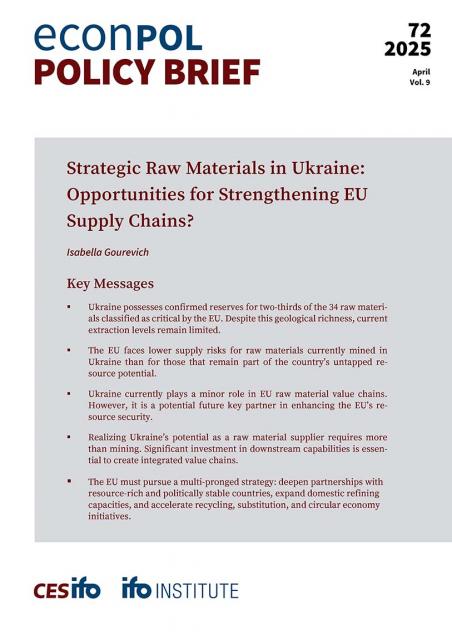News Archive

How Dependent Is Germany on Raw Material Imports?
|
Policy Brief
| News
The Ukraine war and geopolitical tensions pose major challenges for supply chains. Whereas shortages of microchips became a symbol of supply chain disruptions during Covid-19, a survey from June 2022 from the ifo Institute shows that over 74% of German manufacturing firms report production disruptions due to shortages of different types of inputs and raw materials. The production of key technologies that are necessary, for instance for the energy transition, often depends on imported raw materials.

Reforming Economic Governance in the Eurozone
|
Policy Brief
| News
How to deal with the already high levels of national debt in view of rising inflation in the eurozone? In his new Policy Brief Clemens Fuest argues that giving governments more debt leeway is the wrong way to go. Fiscal policy coordination should instead focus more on reallocating public expenditure and thus on increasing its quality rather than its quantity.

The European Added Value of the Recovery and Resilience Facility
|
Policy Report
| News
How do national governments use funds from the European Recovery and Resilience? A new EconPol Policy Report conducts an in-depth analysis of the national recovery and resilience plans of Austria, Belgium, and Germany. The results suggest that the EU funds are extensively used to replace national spending that governments would have made anyway. The share of new investment projects is smallest in Germany (52%) and highest in Belgium (77%). Austria ranks in the middle with 54%.

How Dependent is the German Economy on China?
|
Policy Report
| News
In recent decades, China has risen to become Germany’s most important trading partner for international trade in goods. Has Germany become too dependent from trade with China? A new Policy Report shows that China plays an important, but by no means dominant role for Germany as a supplier or destination market. However, 46% of German firms in the manufacturing sector state that they currently depend on important intermediate inputs from China. Of those, almost half of the firms are planning to reduce imports from China in the future.

Moving From Broad to Targeted Pandemic Fiscal Support
|
Policy Report
| News
This paper conceptualizes an appropriate path for fiscal policy starting from the early phase of the pandemic up to the final transition to a post-pandemic new normal. Using this yardstick, it assesses the initial fiscal response of Member States. It exploits fiscal projections and program data to analyze the adjustment to the economic recovery. For loan guarantee and short-time work schemes, it identifies program-specific parameters that improve target precision and identifies examples of more and less convincing program designs.
